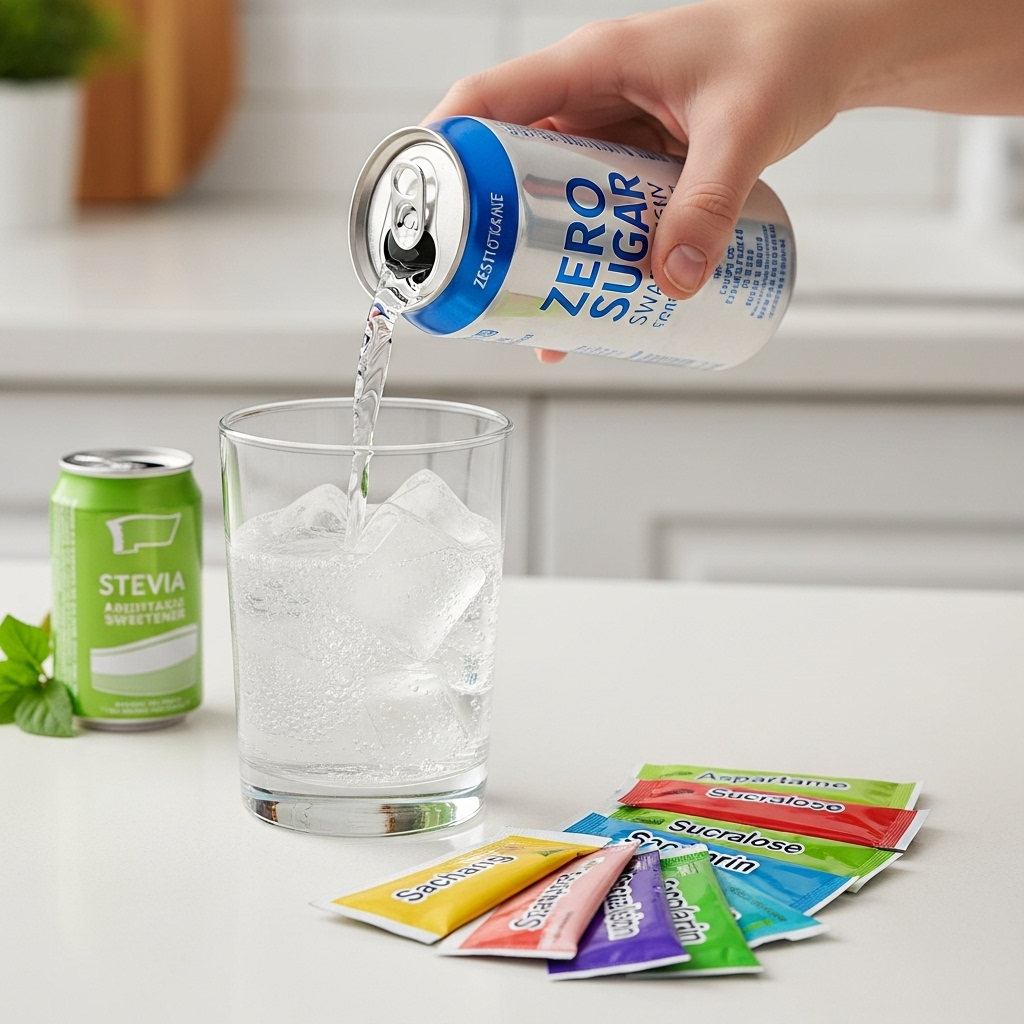Are you a soda lover who's switched to "zero sugar" options to manage your blood glucose? You're not alone. These beverages have gained massive popularity as people seek to reduce their sugar intake while still enjoying carbonated refreshment. But as someone deeply concerned with metabolic health, I find myself asking: are these truly good alternatives, or simply the "less bad" option? Let's dive into what science tells us.
What's Actually in Your Zero-Sugar Soda?
First, let's clarify what we're talking about. FDA regulations require "zero sugar" beverages to contain less than 0.5 grams of sugar per serving. These drinks typically use artificial sweeteners like aspartame, sucralose, and acesulfame potassium, or sometimes natural alternatives like stevia.
The distinction between "diet" and "zero sugar" is often more about marketing than meaningful differences in formulation. Beverage companies have increasingly shifted toward the "zero sugar" label as it sounds more appealing to health-conscious consumers, particularly those concerned about metabolic health.

These sweeteners provide the sweet taste we crave without the calories or glucose-raising effects of sugar. This makes them particularly appealing for people with diabetes or those trying to reduce their risk of developing it.
The Upside: Blood Glucose Benefits
The most obvious benefit of zero-sugar sodas is their minimal impact on blood glucose levels. Unlike regular sodas, which can cause dramatic blood sugar spikes, artificially sweetened beverages typically don't trigger significant glucose or insulin responses in most people.
This matters immensely for metabolic health. Every time your blood glucose spikes significantly, particularly if it happens repeatedly throughout the day, you're contributing to insulin resistance—the precursor to type 2 diabetes. Over time, high glucose exposure damages blood vessels, increases inflammation, and can lead to complications affecting virtually every system in your body.
For someone with diabetes or prediabetes, replacing regular soda with zero-sugar alternatives can:
- Eliminate a major source of glucose spikes
- Reduce daily caloric intake
- Make it easier to maintain consistent blood glucose levels
- Potentially slow the progression of insulin resistance

The Potential Downsides: Beyond Blood Glucose
While the blood glucose benefits are clear, there are several concerns about zero-sugar sodas that deserve attention:
Appetite Dysregulation: Some research suggests that artificial sweeteners might confuse your brain's reward pathways. When you taste sweetness, your body prepares for calories that never arrive, potentially leading to increased hunger and compensatory eating later. The evidence is mixed, but it's worth monitoring your own response.
Gut Microbiome Effects: Our gut bacteria play a crucial role in metabolic health. Some studies indicate that artificial sweeteners may alter the composition and function of gut microbiota, potentially increasing glucose intolerance in susceptible individuals. A 2022 study published in Cell showed that saccharin and sucralose significantly altered gut microbiome function in ways that could affect glucose metabolism.
Metabolic Signaling: Even without raising blood glucose, artificial sweeteners may influence metabolic pathways. Some research suggests they could affect insulin and incretin hormone secretion, potentially impacting long-term metabolic health in ways we don't fully understand yet.
Cardiovascular Concerns: Large observational studies have found associations between regular consumption of artificially sweetened beverages and increased risk of cardiovascular events. While correlation doesn't prove causation, these findings warrant caution.
The Longevity Perspective: What's the Wisest Choice?
When considering any dietary choice through the lens of longevity and metabolic health, we should ask not just "Is this better than the worst option?" but "Is this supporting my health goals?"
From this perspective, zero-sugar sodas occupy a middle ground:
Better than: Regular sugar-sweetened sodas, fruit juices, and other high-sugar beverages that cause glucose spikes and contribute directly to metabolic dysfunction.
Not as good as: Water, unsweetened tea, coffee without sugar, or sparkling water with a splash of lemon or lime.
For someone with diabetes or insulin resistance, zero-sugar sodas can be a helpful transitional tool. If you're currently drinking multiple sugar-sweetened sodas daily, switching to zero-sugar versions will likely improve your metabolic health markers significantly.
However, the ideal approach is to gradually reduce dependence on intensely sweet tastes altogether. Our palates are remarkably adaptable, and over time, you may find that less sweetened beverages become more satisfying as your taste buds reset.
The final verdict? Zero-sugar sodas are a step in the right direction if you're currently consuming sugar-sweetened versions, but they're not the final destination for optimal metabolic health.

Use them strategically, perhaps as an occasional treat rather than a daily staple, while working toward simpler, less processed alternatives for your regular hydration.
References:
-
Suez J, et al. (2022). "Personalized microbiome-driven effects of non-nutritive sweeteners on human glucose tolerance." Cell, 185(18), 3307-3328.
-
Malik VS, Li Y, Pan A, et al. (2019). "Long-term consumption of sugar-sweetened and artificially sweetened beverages and risk of mortality in US adults." Circulation, 139(18), 2113-2125.






